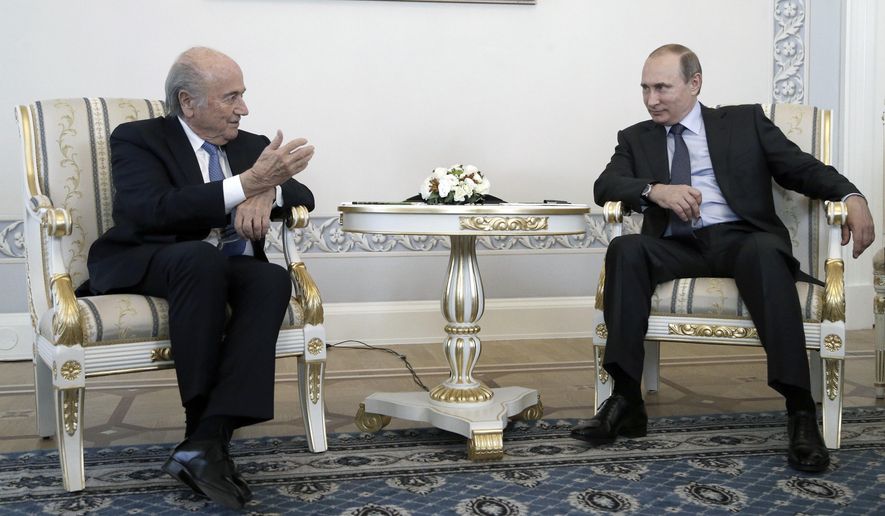President Obama and his Russian counterpart, Vladimir Putin, will meet face to face in New York City on Monday amid growing tensions over the ongoing conflict in Ukraine, the deteriorating situation in Syria and other areas of conflict between the old Cold War foes.
The Kremlin announced the meeting Thursday, and the White House confirmed the sit-down several hours later, though the two sides seem to disagree over what will be the No. 1 topic of discussion.
Russian officials say Syria will be at the top of the agenda. Russia is backing Syrian President Bashar Assad, both financially and militarily, in the nation’s bloody civil war, while the U.S. continues to call for Mr. Assad’s ouster.
The two nations do share a common foe in the Islamic State, the terrorist group that has wreaked havoc across Syria and Iraq.
While the Obama administration agrees Syria will be part of the discussions, officials indicated Thursday that Ukraine — where pro-Russia rebel groups have stoked violence and bloodshed — will be the first issue raised by Mr. Obama.
“I think it makes sense for President Obama to sit down with his counterpart and see if he can get some greater clarity about Russia’s intentions inside of Ukraine and whether or not they’re going to begin to takes steps to abide by the commitments that they have made but failed to live up to, in the context of Ukraine, and whether or not they’re willing to at least consider President Obama’s advice when it comes to reinforcing their military support for the Assad regime,” White House press secretary Josh Earnest told reporters.
He also stated several times that Mr. Putin was the one who asked for the meeting.
Mr. Putin’s spokesman, Dmitry Peskov, had a different understanding of the meeting and its goals.
“Of course the primary topic will be Syria,” he said, adding that Ukraine will be discussed only “if time allows.”
Asked about Mr. Peskov’s comments, Mr. Earnest flatly stated, “there will be time.”
Mr. Obama and Mr. Putin haven’t met in about a year, though they have spoken on the phone several times in recent months. The relationship between the two is, by all accounts, chilly at best. Mr. Obama has described his relationship with Mr. Putin as “businesslike.”
Still, U.S. officials believe there are opportunities for the two countries to work together. The U.S. and Russia were partners in nuclear negotiations with Iran and seemingly were able to work together despite deep tensions over Ukraine and other world hot spots.
Moving forward, Defense Secretary Ashton Carter said he believes the U.S. and Russia can join forces in the fight against the Islamic State that is fighting the Assad regime and effectively runs a state in parts of Syria and Iraq.
“To pursue the defeat of ISIL without, at the same time, pursuing a political transition, is to fuel the very kind of extremism that underlies ISIL, and if that’s the Russian view, that’s a logical contradiction,” he said Thursday, referring to the Islamic State by one of its alternate names. “And the way out of that contradiction is to pursue both of those in parallel, and, on that basis, I think we’re prepared to discuss a way ahead with Russia where the political and the military move in parallel.”
The White House on Thursday also got in a dig at Mr. Putin’s posture, pointing out his habit of frequently looking relaxed, perhaps even bored, during meetings with other world leaders.
In past meetings between the two, Mr. Putin often has been photographed slouching in his chair and his legs spread apart.
Mr. Putin seemed to take a similar tack during a recent meeting with Israeli Prime Minister Benjamin Netanyahu.
“President Putin was striking a now-familiar pose of less-than-perfect posture, unbuttoned jacket, knees spread far apart to convey a particular image,” Mr. Earnest said. “I guess the point is President Putin doesn’t seek to project this image only when President Obama is around. I think this is an image he seeks to project in a variety of international settings.”
⦁ Guy Taylor contributed to this report.
• Ben Wolfgang can be reached at bwolfgang@washingtontimes.com.




Please read our comment policy before commenting.